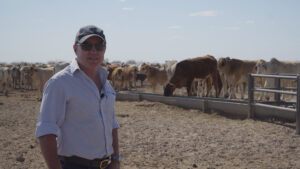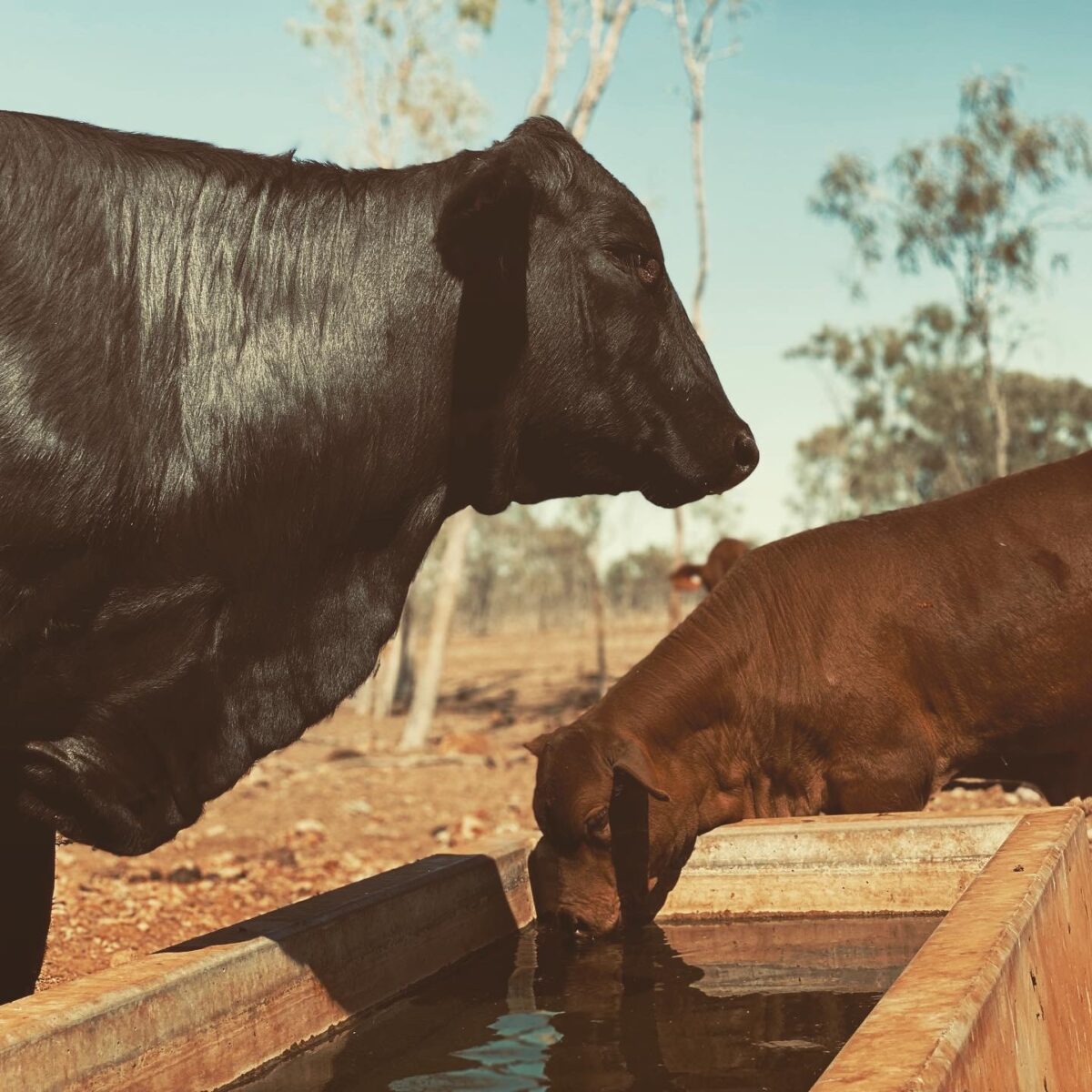August 4, 2021
By Michelle Pelletier Marshall, Global AgInvesting Media
Mark Peart has done a lot of things in his career – aerial- mustering, logistics, property, and aviation, as well as being a self-proclaimed “serial entrepreneur” who has started 20 businesses – and all of it has prepared him for his role as founder and CEO of DIT (Direct Injection Technologies) AgTech. In a world where much has changed, though slowly in the very traditional industry of agriculture where a wary eye is not easily won over with new technology, DIT AgTech has become Australia’s leading expert in livestock technology and nutrient supplementation through water systems.
Paying particular attention to impact – impact on farmers, impact on nature, and impact on the future – DIT AgTech’s solutions stress less harm farming to help farmers better feed the world. Its proportional dosing of supplements in livestock drinking water, which utilizes cloud-based technology linked to remote monitoring to enable farmers to check livestock watering points, feeding devices, or other sites via a mobile device or computer, can reduce costs from $0.40 (US$0.30) to $0.08 (US$0.06) per head per day all while increasing productivity. Customers have reported an increase in Average Daily Gains (ADG) of up to 55 percent and an increase in conception rates of up to 15 percent, meaning more calves on the ground as a result of more efficient delivery (via the water) of nutrients to the animal. Additionally, this more efficient supplementation method reduces inputs and environmental impact on the land while enhancing animal welfare.
Founded in 2016, the company has seen Australia’s leading cattle companies adopt DIT technology through the hard work of the 30+ full-time staff across five locations. The annualised recurring revenue growth has increased by 50 percent in FY21 and the business in on track to see a six-fold increase in annualised recurring revenue in FY22. It was the first agtech business in Australia to take advantage of 2017 equity crowdfunding legislation when it raised A$650,000 (US$486,590) in 2017, and $845,000 (US$617,652) in 2020. Additionally, the team has boot strapped the company to scale and grow, which has included private placements with a variety of financial instruments.
GAI News caught up with Peart at the company’s headquarters in Toowoomba, in Southern Queensland, to get more details.
1). I’ve heard that you can be seen flying your plane around the country in an effort to reach the farmers of Australia’s 97 million cattle and sheep with your message and product. How did your experiences bring you to found DIT AgTech?
As we say in Australia, I’ve been around the bush a bit. I like to think that I listen and learn and as a result I understand the commercial aspects of what we’re doing. Of all my travels and everything I’ve done, agriculture is the last traditional industry, especially livestock production. In Australia, one of the biggest issues is the vastness of the pastoral industry and the remoteness of operations, so my aviation experience has really given me a good understanding of how we could create an agtech business in the Australian livestock space while exploring the substantial opportunity in extensive grazing production systems globally. From my experiences, it was clear to me that tech would disrupt agriculture like it has disrupted every other industry around the globe.
I saw a real problem for farmers, and I wanted to be part of a solution. The Australian landscape is extensive and harsh for animal production system. To increase production out here, you need to manage two key aspects: genetics and the environment. Farmers are getting very good at managing genetics, but managing the environment is much more difficult. Weather patterns are unpredictable, and farmers must supplement their livestock with nutrients to maximize growth and reduce grazing pressures. I felt that if we could better manage livestock supplement intake and tailor it specifically to the animal and the farm, we could increase production. My father had developed water supplementation systems in the 1970s, and this background provided the competitive advantage to apply and adapt current-day technology to a proven concept.
2). Please explain more about your product.
When supplementing in Australia, farmers typically feed livestock different forms of protein plus micro and macro nutrients through what they call a dry lick. This is a hard-formed block that is placed on the ground in the open paddock for the cattle and sheep to lick to get the nutrients they need. This process can be very inefficient, and it’s a logistical nightmare to get it out around the farm – think about the labour hours, vehicle hours, fuel, and emissions involved getting supplement across scale of Australian pastoral operations. More importantly, you can’t measure what is taken up by livestock, so you can’t manage it. So what we do at DIT AgTech is take all those nutrients – and with the use of technology and chemical innovation – we efficiently, safely, and precisely distribute them via the livestock’s drinking water.
Cattle and sheep have to drink, and they drink proportional to their body weight, therefore every animal receives the correct nutrients. And when you put the nutrients in the water, the animals stop hanging around the lick block all day – where they degrade the land and eat all the grass – and they start moving and being active in a much more sustainable grazing pattern. And finally, the farmer can remotely monitor the process which saves labour, vehicles, fuel, and inputs by single point distribution.
3). What is your product reach at this point, and what type of feedback and results have you received?
As with any start-up, managing cashflow is critical, and given the marketing and distribution challenge presented by the vastness and scale of the Australian pastoral sector, we needed to make sure that we targeted the top 10 big customers, instead of 10,000 smaller ones. Currently DIT AgTech products are utilized by four of the top 10 cattle producers in Australia and is well represented across the top 20 percent of producers.
Some of the larger livestock operations in Australia spend millions a year on their supplementation programs, so by changing the delivery mechanism from lick blocks to proportional dosing via the water, we can decrease this cost by up to 80 percent (i.e. 40c down to 8c/head/day). More importantly, because we’re managing the environment, we’re putting the supplements in at exactly the right time each day, day after day, into the drinking water. We’re seeing production benefits. Our customers are increasing their calving and lambing percentages by 10 to 15 percent, and they are putting more weight on their cattle and sheep. So we’re helping to produce more kilos of meat, wool, and milk with less animals on the land, which is more sustainable and better for the environment. As a result, the feedback we’ve received has been great and keeps our team working hard.
4.) That sounds great. So you’re five years into this, what is the expansion plan?
We’re seeing fantastic growth now because when you start engaging with customers that run 50,000-plus head of cattle, and they’re seeing results, they start to move their whole operation to water supplementing. Our job now is to build cadence and rhythm in the business, installing our dosers and supplying supplements every day. Our challenge, typical of many start-ups as they transition from concept to demand, is funding the growth.
5). You are working on the commercialization of your uPro BLUE product (a methane reducing supplement that can be fed via water dosing). Please explain more about this, and the future opportunity it presents.
What a lot of people don’t realize is the biggest methane emitters in the livestock sector are not in the feedlots or the dairies, it is grazing livestock. If you look at our feedlot industry in Australia, there’s a million head of cattle, but there’s 25 million head of cattle that graze out in the pastures. We see an opportunity to not only formulate a product that contains a methane-reducing active ingredient, but to utilize our technology that can deliver, measure, and ultimately report the amount of methane being reduced by a mob of grazing cattle. We’re working now with a couple of universities to run some background trials to collect baseline data to build out a methodology for approval by the Clean Energy Regulator, so that when our customers buy uPRO BLUE, they could potentially get into a position where they can trade their emissions reduction on market. It’s a very exciting project.
We’re working hard to have our product commercialized in the near future and have already patented the technology aiming to be the first in the world to put products through livestock drinking water to reduce methane. There is an opportunity in Australia for this technology, but also countries like Brazil and North America.
6). You have talked of having a long-term, inter-generational view for DIT. Please elaborate on this and the future you envision for the company.
As the founder of DIT, my vision from day one has been to build a global business that will have an impact on global farming trends and be around way past my lifetime. As we progress through the business lifecycle, currently scaling up, we’ve begun to think of ourselves as more than just an agtech business, but rather an impact farming business. Agtech is simply the tool we’re using to get there.
We’re continuing to expand our technology platform with research and development in products for remote monitoring of livestock production systems, measuring devices for data collection (i.e. walk over weighing systems and GPS eartags), and carbon trading through methane reduction technology. But we’ve got to build our brand, our revenues, and customer base to take advantage of being the first mover. I think that in Australia, the agtech industry is going to go through a stage of consolidation very quickly, and we’re positioning ourselves to be at the forefront as one of those bigger players in the sector.
7). Your funding efforts have gone well and helped grow your team and marketing efforts. Where are you at with fundraising now, and what type of opportunities might this present to our Global AgInvesting audience?
We have had conversations with a lot of VCs and high net family offices. Agtech is a hard sell; it’s hard for potential partners to fully understand the potential and we need to keep getting better at articulating that potential. We’ve just closed a $3 million convertible note round, which will continue to support our growth, and our aim is to list our company on the Australian Securities Exchange (ASX) in the future.
We’ve remained very agile. The initial founders in the business and early investors are still the largest shareholders. We are always interested in presenting our business to potential partners and we’d welcome enquiry. Our focus has been to grow our revenues, and along the way we’ve found ways to fund ourselves as revenues build. But as any founder of an agtech business would know – none of this is easy, but we are going somewhere, even out here in the middle of nowhere.
ABOUT MARK PEART
DIT AgTech CEO and Founder Mark Peart’s passion and skill base lies in recognizing opportunities in business and technology and making them commercially viable, with a diverse background in agriculture, aviation, and property development. With strong ties to the land, Peart founded DIT Technologies based on the legacy work of his father and uncle on water supplementing cattle in Australia. Utilizing new technology and innovation, he has since transformed DIT into one of Australia‘s leading Ag technology companies.
 Peart is particularly passionate about agriculture, having been raised on sheep and cattle properties throughout Queensland. His love of flying was born on completing his courses on farm management, and then his experience helicopter mustering in outback Australia led to 25 years in aviation, flying both fixed-wing aircraft and helicopters. He has launched a number of aviation companies and is currently managing director of Light Jets Australia, a company he launched in 2011, and also director of Archerfield Jet Base, a Brisbane Fixed Base Operator, providing aircraft storage, passenger and pilot amenities, and support services for private flyers.
Peart is particularly passionate about agriculture, having been raised on sheep and cattle properties throughout Queensland. His love of flying was born on completing his courses on farm management, and then his experience helicopter mustering in outback Australia led to 25 years in aviation, flying both fixed-wing aircraft and helicopters. He has launched a number of aviation companies and is currently managing director of Light Jets Australia, a company he launched in 2011, and also director of Archerfield Jet Base, a Brisbane Fixed Base Operator, providing aircraft storage, passenger and pilot amenities, and support services for private flyers.
Peart makes his home in Toowoomba with his wife Fiona and their four children.
 – Michelle Pelletier Marshall is contributing editor and author for HighQuest Partners’ GAI News and Oilseed & Grain News, and managing editor for its WIA Today blog. Additionally, she is the company’s PR/Media Manager. She can be reached at marshall@highquestpartners.com.
– Michelle Pelletier Marshall is contributing editor and author for HighQuest Partners’ GAI News and Oilseed & Grain News, and managing editor for its WIA Today blog. Additionally, she is the company’s PR/Media Manager. She can be reached at marshall@highquestpartners.com.

Let GAI News inform your engagement in the agriculture sector.
GAI News provides crucial and timely news and insight to help you stay ahead of critical agricultural trends through free delivery of two weekly newsletters, Ag Investing Weekly and AgTech Intel.




